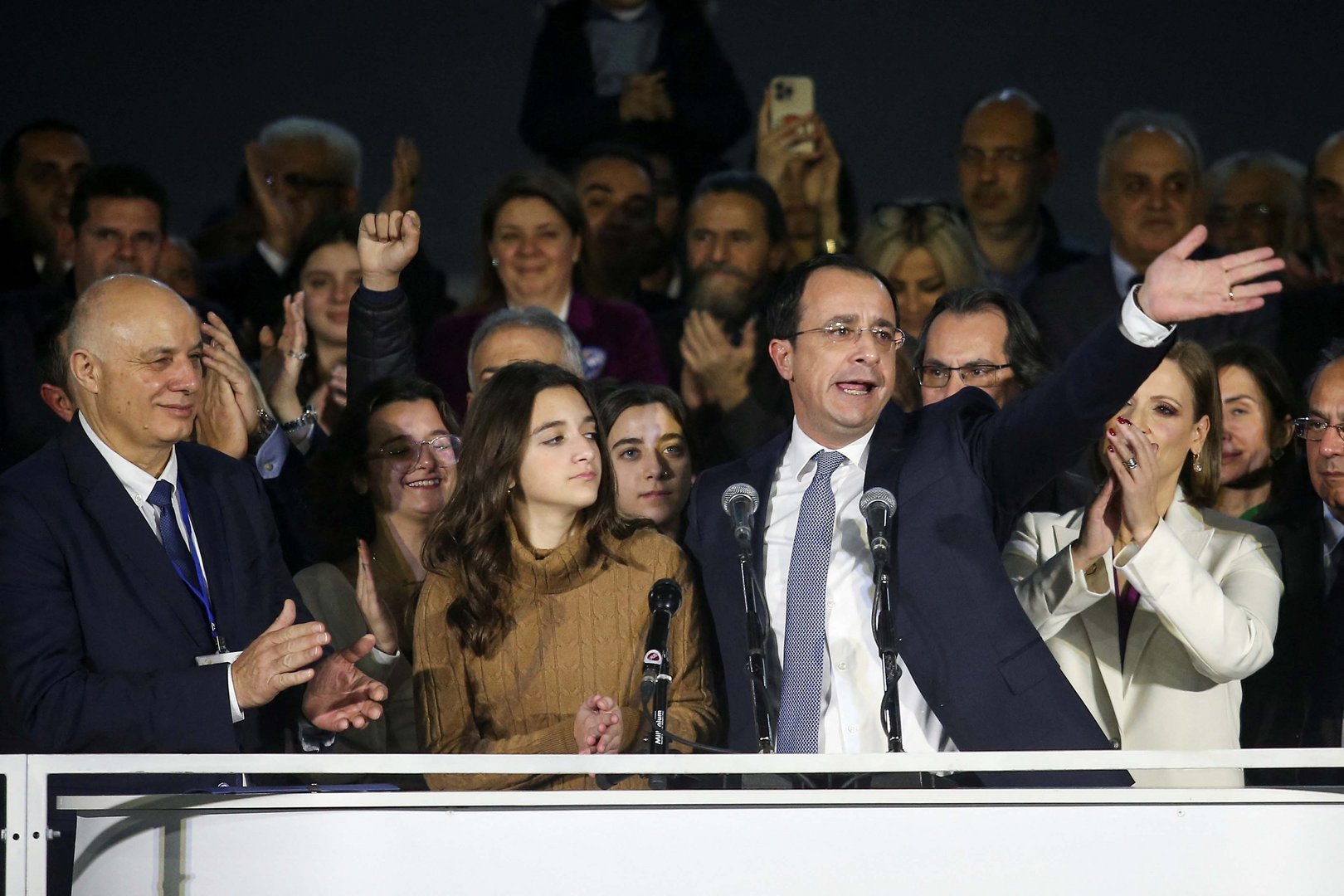Victory against a backdrop of watered down traditional partisanship and a real abstention rate of 45 per cent
Though a close call, Nikos Christodoulides’ win last Sunday came down to a confluence of factors – his success in casting a wide net to ‘bag’ supporters from all segments of the electorate, people’s general disaffection with politics and the ‘traditional’ parties, but also strategic and tactical errors by his two main rivals.
“In a nutshell, what happened is what I said weeks ago: it wasn’t so much that Christodoulides was a strong candidate, but rather that his opponents were even weaker,” is how political analyst Christoforos Christoforou sums it up.
The president-elect’s tactic of offering a little something to everyone, his generic positions on issues like the economy and the Cyprus issue, and of course the inroads he made with a large cross-section of Disy supporters – and even with some Akel fans – proved enough to carry the day.
Even a surface-level analysis shows that 70 per cent of Disy voters actually preferred Christodoulides. Diko, Edek and Dipa rallied around Christodoulides while Elam’s 79 per cent of voters also supported him.
And just over half of the voters (52 per cent) who cast a ballot for Neophytou in the first round, then supported Christodoulides in the runoff. A remaining 43.5 per cent backed Mavroyiannis while 4.5 per cent cast a blank or invalid vote.
“It looks like Christodoulides tapped into the weakening partisan politics, where a segment of the electorate has overcome the right-left cleavage,” comments Christoforou.
“It’s a trend that started manifesting some 20 years ago. For example, an opinion poll back in 2001, ahead of the parliamentary elections, notably found that a non-negligible percentage of people, normally affiliated with the right or the left, stood ready to vote ‘for the other side’, so to speak.”
And that trend has grown ever since.
This watering down of traditional partisanship and the breaking down of ideological barriers can also be seen in the emergence of a dozen or so parties. Today the political landscape is far more fragmented, and the Cypriot electorate can no longer be taken for granted.
Christodoulides played into this general state of affairs, as well as into the growing disappointment or disinterest in the Cyprus problem. A breakdown of the election results shows that approximately 80 per cent of those voting for him are not in favour of a bizonal, bicommunal federation as the model for a settlement of the Cyprus issue.
Says Christoforou: “His rhetoric on the Cyprus issue is closer to that of Diko…that is to say, seeking a solution ‘with the right content’. Which is essentially code for the rejectionist position, but he [Christodoulides] obviously doesn’t come out and say it. Without being too overt, he was signaling to the rejectionist camp – Diko, Edek, Dipa Solidarity, but also a segment of Disy supporters – his anti-settlement credentials.”
To an extent, Akel-backed Andreas Mavroyiannis tried to play the same game. Up until the day he formally submitted his candidacy, he avoided being too critical of the policies of President Nicos Anastasiades on the Cyprus issue.
“Recall that when Anastasiades had floated the idea for a two-state solution, Mavroyiannis sought to downplay this, calling it merely brainstorming.”
In Christoforou’s book, Disy were the clear losers of this election. And not just because they didn’t ultimately win, but in the way they lost. In the first round, Averof Neophytou managed to get only 100,000 votes – a debacle for the party.
But what caused the failure for Disy? Its association with the government amid the current dire economic situation? In short, was Disy’s loss inevitable?
Christoforou doesn’t think so.
“The perception out there vis a vis the economy and inflation is that it’s down to external factors – the war in Ukraine etc. I don’t believe that by and large people blamed the administration for mishandling the economy. And besides, surveys during the election campaign showed that Neophytou got the highest ratings when respondents were asked which of the candidates could better handle economic matters.”
“Plain and simple, the problem was the candidate himself – Neophytou. He just wasn’t popular. We can cite several reasons. One was that he supported the government through thick and thin, despite the government’s image tarnished by all the scandals in recent years.”
And the Disy leader’s campaign approach didn’t help him either. Trying hard to sell himself as a ‘man of the people’, one day he’d ride a tractor, the next day he’d be picking watermelons. “It was too artificial, and people saw right through it.”
On the other end, Akel likewise made errors. Whereas the base did rally around Mavroyiannis, the party did not do a very good job of reaching out to people beyond the Akel sphere. Throughout the election campaign, the communist party stuck to its guns about the financial meltdown of 2012-2013 – never admitting that the administration of Demetris Christofias shared at least some of the blame, and instead blaming everything on the banks.
“Instead of demonstrating that they can acknowledge their mistakes, and learn from them, they doubled down,” remarks Christoforou.
In the analyst’s view, a big takeaway from the 2023 elections is that the centre of the political spectrum managed to make a comeback after their poor showing in recent years. This, coupled with the fluid politics mentioned earlier, enabled Christodoulides to break through.
Stavros Tombazos, professor of Political Science at the University of Cyprus, agrees that none of the three main candidates were strong. But he zooms in on the flaws of the Mavroyiannis candidacy.
“Mavroyiannis failed to appeal to the broader left. For years he was associated with the Anastasiades government, he once called the Annan peace plan’ horrible’, and he blamed the failure of the Crans-Montana talks on the Turks. That’s bound to alienate many within the pro-settlement camp.”
But the single largest drawback for the Mavroyiannis candidacy is that it came across as fake, phony.
“For example,” explains Tombazos, “in a bid to portray himself as an ‘independent’, so as to woo a wide cross-section of voters, he even said on the record that he himself never voted for Akel in his life. That was supposed to be an asset.”
The analyst thinks that here lies the biggest mistake made by Akel.
“To use a football term, they tried to pull off a transfer on loan – by signing on someone like Mavroyiannis from the centre of the political spectrum, but who’s more on the conservative side.”
According to Tombazos, Akel also failed to capitalise on something else – the increasing proportion of people disgruntled with politics.
Officially, the abstention rate stood at around 28 per cent. But if you factor in the people eligible to vote but who didn’t bother to register, the real abstention comes to at least 45 per cent.
In the professor’s view, the majority of this pool of potential voters would, if energised, lean left and vote for such a candidate. In particular, many young people who stay away from politics are primarily concerned with low wages and the lack of career prospects. They would therefore welcome a politician who shows that he or she genuinely cares about that.
“Instead, what did we get? Platitudes and hollow slogans. Like the other two, Mavroyiannis kept repeating the mantra that he wants a strong economy. Yeah so? Who doesn’t?”
Employing another analogy from football, Tombazos offers: “Akel’s strategy focused on not losing any voters – rather than on gaining voters. It’s like a team that decides to play mass defence, then concedes a goal and it’s game over.”









Click here to change your cookie preferences